
International Journal of Intelligent Transportation Systems Research
Scope & Guideline
Fostering Knowledge for Safer, Efficient Travel
Introduction
Aims and Scopes
- Intelligent Transportation System Design and Optimization:
Research focusing on the design, optimization, and implementation of ITS solutions that enhance traffic management, improve safety, and increase efficiency in transportation networks. - Machine Learning and Artificial Intelligence Applications:
Utilization of machine learning, deep learning, and AI techniques to solve complex problems in transportation, such as traffic prediction, vehicle classification, and autonomous driving. - Traffic Modeling and Simulation:
Development of models and simulations to analyze traffic flow, congestion, and vehicle interactions, enabling better decision-making in transportation planning and management. - Human Factors and Behavioral Analysis:
Studies exploring the interactions between human drivers and transportation systems, including driver behavior, decision-making processes, and the impact of technology on driving. - Sustainability and Environmental Impact:
Research addressing the environmental implications of transportation systems, focusing on sustainable practices, energy efficiency, and the integration of electric and autonomous vehicles. - Data-Driven Approaches in Transportation:
Emphasis on data collection, analysis, and visualization techniques to inform transportation policies and practices, enhancing the overall understanding of travel behavior and system performance.
Trending and Emerging
- Autonomous Vehicle Technologies:
There is a marked increase in research related to autonomous vehicles, including their integration into existing traffic systems, safety considerations, and user acceptance. - Blockchain in Transportation:
The application of blockchain technology for secure and efficient transportation systems, including toll collection and data sharing, is gaining momentum. - Smart Cities and Urban Mobility:
A growing focus on the interplay between intelligent transportation systems and urban development, emphasizing sustainable urban mobility solutions and smart city frameworks. - Real-Time Traffic Management Systems:
Emerging research is concentrating on real-time data utilization for traffic management, enhancing the efficiency of traffic flow and emergency response. - Human-Machine Interaction in ITS:
Research on the interaction between humans and intelligent systems, including user interfaces and behavioral responses to advanced driving assistance systems, is becoming increasingly prominent.
Declining or Waning
- Traditional Traffic Control Methods:
Research focused on conventional traffic signal control methods is decreasing, as more innovative approaches using AI and real-time data analytics gain traction. - Static Traffic Modeling:
Static models that do not account for dynamic changes in traffic conditions are receiving less attention, with a shift towards more adaptive and responsive modeling techniques. - Non-Integrated Transportation Systems:
Studies that treat transportation systems in isolation, without considering integrative approaches involving multiple modes of transport, are becoming less common as holistic transportation solutions are prioritized. - Conventional Vehicle Tracking Methods:
The interest in traditional tracking systems is waning, giving way to advanced technologies such as V2X communications and machine learning-based tracking systems.
Similar Journals

INTERNATIONAL JOURNAL OF AUTOMOTIVE TECHNOLOGY
Exploring New Horizons in Automotive AdvancementsINTERNATIONAL JOURNAL OF AUTOMOTIVE TECHNOLOGY, published by the Korean Society of Automotive Engineers (KSAE), stands as a key platform in the field of Automotive Engineering since its inception in 2000. With an ISSN of 1229-9138 and an E-ISSN of 1976-3832, this esteemed journal aims to disseminate cutting-edge research, innovative methodologies, and advancements in automotive technology. As of 2023, it holds a distinguished Q2 quartile ranking in the Automotive Engineering category on Scopus, featuring a competitive rank of 48/125, illustrating its recognition among peers and the academic community. The journal also enjoys a global readership despite its base in South Korea. Researchers, professionals, and students in the automotive sector are encouraged to contribute to this journal, thus promoting collaboration and knowledge exchange that fosters innovation and progress in automotive engineering. Additionally, the journal is committed to enhancing accessibility of knowledge across boundaries and aims to continue serving as a catalyst for academic growth up to the year 2024.

Frontiers in Future Transportation
Connecting Ideas for Future TransportFrontiers in Future Transportation, published by FRONTIERS MEDIA SA, is an influential Open Access journal that has been at the forefront of research since its inception in 2020. With an ISSN of N/A and E-ISSN 2673-5210, this journal provides a comprehensive platform for cutting-edge studies in the field of transportation, encompassing urban studies, automotive engineering, and innovative control systems. Ranking impressively in Scopus with notable percentiles—61st in Urban Studies, 51st in Automotive Engineering, and others—it underscores its significance within the scholarly community. The journal is committed to advancing the discourse surrounding sustainable and smart transportation solutions that address the challenges of future mobility. By offering unrestricted access to research, it invites contributions from researchers, professionals, and students alike, fostering collaboration and disseminating knowledge pivotal to transforming transportation systems globally. With its headquarters based in Lausanne, Switzerland, Frontiers in Future Transportation is poised to make substantial contributions to the evolving landscape of transport research through 2024 and beyond.
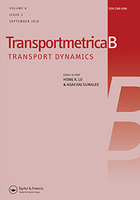
Transportmetrica B-Transport Dynamics
Advancing Knowledge in Transportation DynamicsTransportmetrica B: Transport Dynamics is a premier academic journal published by Taylor & Francis Ltd, focusing on innovative research in the fields of transportation dynamics, modeling, and simulation. Established in 2013 and running through 2024, this journal holds a prestigious Q1 ranking in Modeling and Simulation, Software, and Transportation categories, reflecting its commitment to high-quality scholarship. With an impactful presence, evidenced by its Scopus rankings—73rd in Mathematics, 57th in Social Sciences, and 174th in Computer Science—Transportmetrica B serves as a critical platform for researchers, professionals, and students seeking to explore and disseminate groundbreaking findings in transport dynamics. The journal is accessible via open access options, ensuring that its valuable insights reach a global audience. As the field of transport continues to evolve, Transportmetrica B remains at the forefront, championing extensive research and development that address the challenges of modern transportation systems.
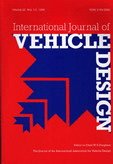
INTERNATIONAL JOURNAL OF VEHICLE DESIGN
Advancing Knowledge in Vehicle Design and PerformanceThe INTERNATIONAL JOURNAL OF VEHICLE DESIGN is a distinguished publication that has been at the forefront of automotive engineering and mechanical design since its inception in 1979. Published by INDERSCIENCE ENTERPRISES LTD in the United Kingdom, this journal aims to foster innovative research and technical knowledge in the field of vehicle design, encompassing various aspects from conceptualization to manufacturing and performance analysis. With an ISSN of 0143-3369 and an E-ISSN of 1741-5314, the journal extends its accessibility to a global audience, although it currently does not operate under an open access model. Recognized for its scholarly contributions, it holds a Q3 ranking in Automotive Engineering and a Q4 ranking in Mechanical Engineering as of 2023, reflecting its position among peers with an increasing impact in the discipline. Researchers, professionals, and students will find valuable insights and cutting-edge research in the articles published, contributing to a deeper understanding of advancing vehicle technologies and methodologies. For inquiries, the journal is based at the World Trade Center Building, 29 Route de Pré-Bois, Case Postale 856, CH-1215 Geneva, Switzerland, where one can also follow its developments and contribution to the growing body of knowledge in vehicle design.
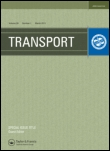
Transport
Fostering collaborations for a sustainable transport future.Transport is a leading open-access journal published by VILNIUS GEDIMINAS TECH UNIVERSITY, specializing in the fields of automotive and mechanical engineering. Since its transition to open access in 2018, the journal has become a vital platform for disseminating high-quality research and innovative practices in transport systems, engineering technologies, and sustainable mobility solutions. With an ISSN of 1648-4142 and an E-ISSN of 1648-3480, Transport is indexed in Scopus with notable rankings, including Q2 in Automotive Engineering and Q3 in Mechanical Engineering for 2023, reflecting its influential presence within these disciplines. Researchers and practitioners are encouraged to contribute to this scholarly community, where their work will reach a robust international audience, thereby advancing knowledge and fostering collaborations in the ever-evolving transport sector. Based in Lithuania, the journal is committed to maintaining rigorous peer-review standards and promoting interdisciplinary studies to address the complex challenges in transportation engineering.
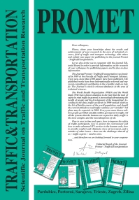
Promet-Traffic & Transportation
Fostering Global Collaboration in Traffic and Transportation StudiesPromet-Traffic & Transportation is a premier open-access journal published by SVEUCILISTE U ZAGREBU, FAKULTET PROMETNIH ZNANOSTI, dedicated to advancing the fields of traffic and transportation engineering. Since its inception in 2001, the journal has played a crucial role in disseminating innovative research and best practices within its scope, which embraces civil and structural engineering, urban studies, and various engineering disciplines. With a Q3 ranking in multiple categories as of 2023, including Civil and Structural Engineering and Ocean Engineering, Promet is positioned to provide valuable insights into contemporary challenges and solutions in transportation systems. Open-access since 2013, the journal ensures that all published articles are freely available to researchers, practitioners, and students globally, fostering a collaborative environment for knowledge exchange. Based in Croatia, it serves as an essential platform for interdisciplinary studies that influence the future of traffic and transportation policies and practices.
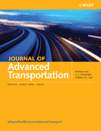
JOURNAL OF ADVANCED TRANSPORTATION
Empowering Global Collaboration in Transportation StudiesJOURNAL OF ADVANCED TRANSPORTATION, published by WILEY-HINDAWI, stands as a pivotal platform in the fields of automotive engineering, computer science applications, economics, mechanical engineering, and strategy and management. With an impressive impact factor and positioned in the Q2 quartile across multiple categories as of 2023, this open-access journal offers researchers, professionals, and students unparalleled opportunities to disseminate and access cutting-edge research. Operating under an open access model since 2017, the journal fosters global collaboration and knowledge exchange, encouraging innovative solutions to contemporary transportation challenges. Its comprehensive scope, spanning converged years from 1979 to 2024, reflects its commitment to addressing the evolving landscape of transport systems worldwide. Researchers from diverse disciplines are invited to contribute transformative studies that advance the field and inspire future endeavors.
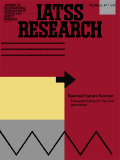
IATSS Research
Innovating research for a safer, smarter tomorrow.IATSS Research, published by Elsevier Science Ltd, stands as a premier open-access journal at the intersection of engineering, safety research, urban studies, and transportation. Established in 2000, this esteemed journal caters to a diverse audience of researchers, industry professionals, and students eager to delve into innovative research that addresses pressing societal challenges. With an impressive impact factor and a consistent demonstration of high-quality scholarship, IATSS Research has achieved notable rankings within Scopus, including a top-tier position in Safety Research (Rank #13/109, 88th percentile) and Engineering (Rank #46/307, 85th percentile). The journal has evolved significantly since its inception, reflecting the dynamic nature of its converged fields from 2008 to 2024. By embracing open access, IATSS Research amplifies the reach of critical findings and fosters collaboration across disciplines, making it an invaluable resource for anyone invested in advancing knowledge and practices in modern engineering and urban safety.

Ingineria Automobilului
Transforming Ideas into Automotive InnovationsIngineria Automobilului is a prominent journal dedicated to advancing knowledge in the field of automotive engineering. Published by the SOC AUTOMOTIVE ENGINEERS ROMANIA, this journal serves as a vital platform for the dissemination of high-quality research, innovative methodologies, and groundbreaking applications in automotive technology. With an ISSN of 1842-4074, it provides an essential resource for researchers, professionals, and students who are committed to the development and enhancement of automotive systems. Although the journal currently does not offer open access, its contributions are crucial for ongoing advancements in automotive design, safety, and sustainability. The publication aims to foster collaboration between academia and industry, emphasizing the importance of interdisciplinary approaches in solving complex challenges facing the automotive sector today. By facilitating discussions on emerging technologies and engineering practices, Ingineria Automobilului continues to play a pivotal role in shaping the future of automotive engineering.

IEEE Open Journal of Intelligent Transportation Systems
Driving Innovation in Intelligent Transportation.IEEE Open Journal of Intelligent Transportation Systems, published by the IEEE-INST ELECTRICAL ELECTRONICS ENGINEERS INC, stands at the forefront of innovation in the realm of intelligent transportation systems since its inception in 2020. With its open-access format, this journal aims to disseminate groundbreaking research and technology advancements to a broader audience, fostering collaboration and knowledge exchange among professionals in the automotive, mechanical, and computer science engineering sectors. It boasts impressive Q1 rankings in Automotive Engineering, Computer Science Applications, and Mechanical Engineering as of 2023, highlighting its critical role in shaping the future of transportation technologies. The journal's exceptional standing is further evidenced by its Scopus rankings; it holds the 76th percentile in Mechanical Engineering and the 74th percentile in Automotive Engineering, making it a premier outlet for cutting-edge research. Researchers, professionals, and students seeking to navigate the evolving challenges and solutions in intelligent transportation systems will find this journal an invaluable resource.